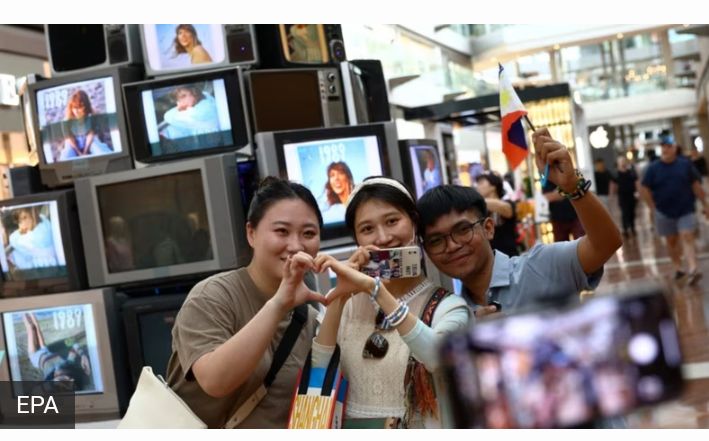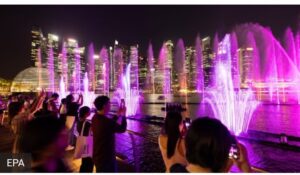CELEBRITY
Bad blood over Singapore Taylor Swift tour subsidies

The city’s hosting Taylor Swift’s Eras tour this week – an honour, but one that has come at a cost.
That price was initially reported to be as high as S$24 million (£14m; $18m) for the six shows to be exclusive to the South East Asian country.
Culture minister Edwin Tong has since told Singapore’s CNA the figure was “nowhere as high” – although he still refused to be drawn on the exact figure. The broadcaster, however, suggested it may have been just S$2m for all six.
But the fact any money had been spent only came to light after an outburst from the prime minister of Thailand, who accused Singapore of paying concert organisers US$2-3m per night.
That triggered criticism across the region. In the Philippines, a lawmaker criticised the move, saying “this isn’t what good neighbours do” – and called for a formal protest against the grant.
But while governments are seeing red – it’s the fans who are paying the price, literally.
Swift is heard everywhere across South East Asia, home to roughly 700 million people – from alleyways in Ho Chi Minh to taxi cabs in Bangkok.
So for many it was a punch in the guts to learn all six shows would be held in the region’s most expensive city.
Singapore’s currency – one of the strongest in Asia – has long been a deterrent for visitors. But for a chance to see their idol, many of her fans are willing to grin and bear it.
Flight-loads of fans have been touching down at Singapore’s Changi Airport all week, many coming from China and its territories.
Swift isn’t playing in China so Singapore is the next best thing for many.
One woman flying in from Shenzhen told the BBC she and her friend had spent S$1,200 each on tickets alone. They’ve resorted to camping at a friend’s house after hotel rates across the city surged.

On the luxe end of things, the city’s landmark hotel Marina Bay Sands has sold out of its S$50,000 Swift packages which included four VIP tickets and a three-night stay in a suite.
Then there’s 22-year-old Allen Dungca in the Philippines, who scraped together his wages to take him and his mother to Singapore.
This Thursday, they’ll take a four-hour bus ride to Manila, stay at an airport motel for the night, then grab their dawn flight the next day.
The enterprising student snapped up the travel package back in July. He eventually tracked down the tickets on a resale night, after weeks of desperate hunting.
“I am very lucky,” he says of the S$400 outlay for seats in the nosebleed section. “The seller was kind and not a scalper.”
Resales now are going for thousands. And he had almost fallen for a scam, a shady character named Pat Steve, later exposed online
He estimates the whole endeavour is costing him S$2,000 – the monthly income of an upper-middle class family in the Philippines, a country where a fifth of the population lives under the poverty line.
“Right now, I’m a student with a part-time job and I can afford my wants and needs. But it’s sad, other Swifties don’t have any means or budget to watch her overseas and I know most Filipino Swifties love her so much.”
The Philippines arguably has the most ardent Swift fan base – Spotify data showed Quezon City in Manila had played the most streams of the singer last year.
The pop star has toured in the Philippines before – but the bag of money from Singapore undoubtedly sweetened the deal, say analysts.
Clean, modern Singapore has long been seen as a base in the region for big events. It has the infrastructure, the transport links and a high-earning, expat-heavy population

It’s also seen as reliably stable in a region which has experienced political chaos. A decade ago Swift cancelled her shows in Thailand because of the military coup and resulting protests.
Still, while it’s common for governments around the world to give out subsidies and tax breaks to bring in events, the reported spend goes beyond anything else publicly known in Singapore.
Samer Hajjar, a marketing lecturer at the National University of Singapore, says it’s “above average” even for the city-state.
And fans are quite blunt. “It’s kinda greedy,” says Mr Dunga. “But it’s wise… because their economic response will be way more than that.
In Australia, the leg of the tour preceding Singapore, officials suggested the tour had provided a A$145m “uplift” in consumer spending. More than 570,000 tickets were sold across seven nights in Sydney and Melbourne, nearly double the number sold for Singapore’s six shows.
But not all of that money counts, says economists.
More than 90% of show-goers were probably local, estimates KPMG’s chief economist Dr Brendan Rynne, so their dollars would be “just a transfer from one category of spending (or saving) to another”.






